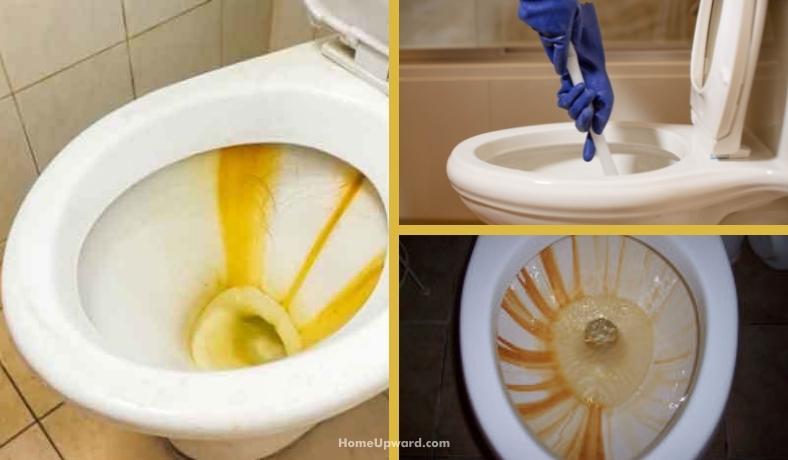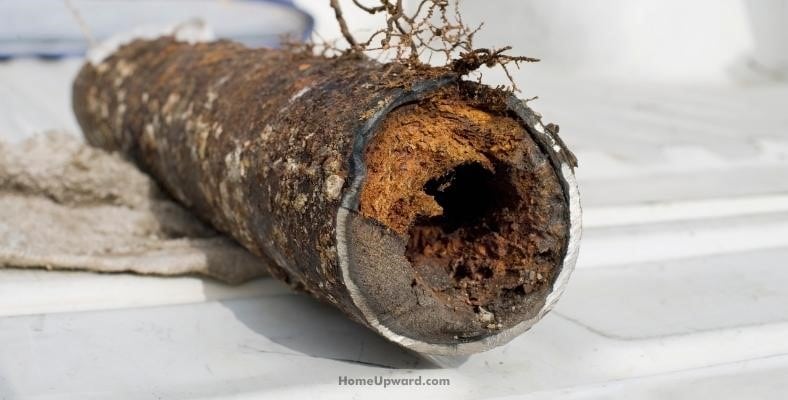Contents
Why is My Toilet Water Brown?
There are a number of possible reasons why you have brown toilet water. Let’s dig in and cover them.
Rusted Pipes
Do you know when your house was built? If you live in the U.S. and your house was built before 1960, your plumbing fixtures might be rusted.
If your plumbing fixtures have rusted then the water that comes from those rusted pipes will have a brown-red hue. Most often rusty brown water in the toilet means that rust is present somewhere in your plumbing system.
There are some areas to test for consistent indications of rust:
- Tap water output
- Laundry hook-ups
- Shower
The presence of rusty water in your tap faucet or rust stains in your washing machine may be a sign that your house’s plumbing system has rusted.
Well Water Problems
Some homes are not on a city water system and instead rely on wells for their potable water. If your home is hooked up to well water, a brownish-red hue in your toilet may indicate that your well has been damaged.
When a well is damaged, say from a storm, sediment can leak into the water, turning it brown.
Unlike city water systems, which are monitored by scientists and professionals, well water systems are unmonitored, which makes it difficult to determine the reason for a sudden change in water color.
Changes in the appearance or quality of your well water can be serious. If your home is on a well water supply, then consider calling a professional to make sure your drinking water is safe.
Rusted Toilet Parts
If the water coming from your tap, shower, and laundry water is clear, then rusted toilet parts may be the cause of the brown water in your toilet.
To find out if a rusted part is causing the discoloration of your toilet water or bowl, remove the lid from your toilet’s tank and look for any parts that show signs of wear.
If one or more parts in the tank of your toilet are rusted they’re the likely cause of it.
Hard Water Mineral Buildup
Cleaning your toilet can also be a reason your toilet water is brown. Yes, you read that correctly!
Cleaning your toilet with a cleaner that has calcium or manganese can set off a chemical reaction that can lead to hard water mineral buildup in your plumbing system.
Use cleaning products specifically designed for toilets to prevent the buildup of mineral deposits in your plumbing system.
Check directions on the back of the cleaner you’d like to use to make sure it’s safe for toilet use.
Clogged Pipe Buildup
Brown water in your toilet could be the result of a blocked plumbing line. Blocked, or clogged, pipes usually result from flushing foreign objects down the toilet.
If you have small children or pets, the brown water in your toilet could suggest that a toy is in your plumbing and causing a clog.
If you’re not able to clear a suspected clog with a plunger, call a plumber. Clogged pipes are susceptible to pressure buildup.
If the pressure in a clogged pipe exceeds the strength of the pipe itself, a rupture could occur and cause water damage in other parts of your house.
How Do You Fix Brown Toilet Water?
Replace Rusty Parts
When you checked your toilet, did the parts under the lid look like a rusted shipwreck? If the parts in your toilet tank look like they may be hiding sunken treasure, it’s likely time to replace those rusty parts.
Some toilet parts are easier to replace than others. If you can safely and confidently remove the rusted components of your toilet, do so. Consider calling a professional if do-it-yourself repairs are not your cup of tea.
Increase the Flush Power
Even the most well-maintained plumbing systems wear down over time. Worn parts may lead to a decrease in flushing power. If your toilet is unable to complete its full flush cycle it might be due to a blockage that can lead to brown water buildup.
If you have noticed a significant decrease in your toilet’s flushing ability remove your toilet tank’s lid and check the water level. If the water level in your tank looks low, raise it to increase your toilet’s flushing performance.
Adjusting the water level in your tank is fairly simple.
Use Vinegar to Clean the Toilet
Our grandmothers were right. Vinegar is a miracle worker. Vinegar has chemical properties that make it a natural rust remover.
Vinegar is naturally acidic, meaning that it can decalcify mineral deposits clogging your plumbing and causing your toilet water to turn brown.
Soak your toilet bowl and tank in a solution of two parts hot water and one part vinegar to remove debris from your toilet’s system. Soaking your toilet in a vinegar solution has the added benefit of sterilizing your toilet, too!
The presence of iron in your toilet isn’t inherently dangerous. In rare instances, however, harmful iron bacteria may form. A vinegar soak can help get rid of this rare but potential danger.
Remove Rust With Water Softeners
You can remove rust from your water supply by installing a water softener. Water softeners use salt to remove iron and hard minerals from your water.
Water softeners are low maintenance, only requiring an occasional water salt refill to keep working. With their relatively cheap installation and maintenance costs, they’re a good way to remove brown water and hard water stains from your toilet.
Change the Pump
If your toilet clogs frequently, you should consider installing an after-market water pump in your toilet tank. Installing a new water pump in your tank will flush out toilet bowl stains and help keep your plumbing system clog-free.
Call a Plumber
When all else fails, call a professional. A professional plumber has the training to fix your brown toilet water problem and the knowledge to help you prevent it from happening again.
What Causes Rust in Pipes or a Toilet?
The presence of rust in your water, or rust stains on the surfaces of your appliances, is the result of iron reacting with water and oxygen.
Rust itself is not harmful but the presence of rust in your water can be a sign that your plumbing system requires repair or replacement.
How Much Does Professional Plumbing Repair or New Pipes Cost?
Professional plumbing repair rates vary according to geographic location and the nature of the repair in question. On average, most common plumbing repairs cost a few hundred dollars.
If you happen to have a more serious repair on your hands, don’t worry. Your plumber will explain what is wrong, how they will fix it, and quote the estimated project price before they begin work.
Plumbers will usually work with you to find a solution that meets your needs and budget.
In rare instances, your plumbing system may have too many problems for piece-meal repairs to be cost-effective. In that case, it may be time to replace part, or all, of your plumbing system.
The best thing to do usually is to get a 2nd or even 3rd opinions form additional plumbers if it’s a going to cause you financial hardship or if you have doubts about the repair options you have.





